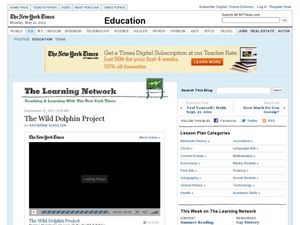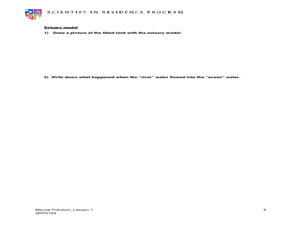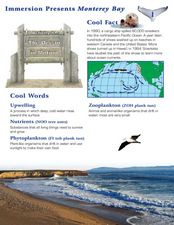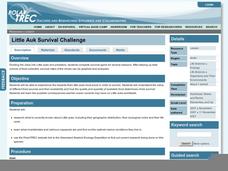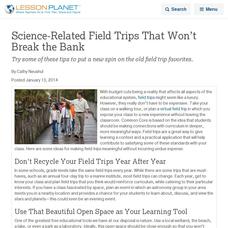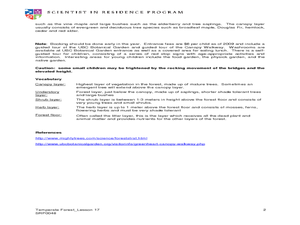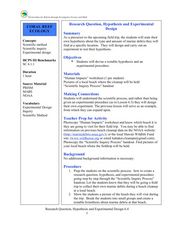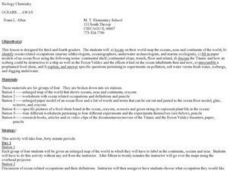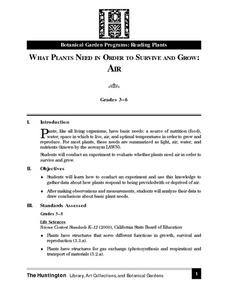Curated OER
WET Science Lesson #11: How Light Affects Water
Scientists listen to the story of Wadja Egnankou who works to save African mangrove forests. They experiment with refraction and the introduction of particulate matter to water. They conclude with creative writing about the need for a...
Curated OER
The Wild Dolphin Project
Inspire young marine biologists to study animals in the wild with this assignment. Pupils view an eight-minute video and read an article in the New York Times about Denise Herzing's 25-year long study of dolphins in their own natural...
Curated OER
Rubber Duckies and Ocean Currents
Students explore marine life by conducting a rubber duck experiment. In this water currents lesson plan, students practice identifying latitude and longitude coordinates on a map and define the currents of major oceans. Students discuss...
Project WET Foundation
Discover Our Ocean
A very informative interactive presents ocean zones, estuaries, hot water vents, phytoplankton, coral reefs, sea turtles, kelp forests, and all things that thrive in the ocean.
Curated OER
Modeling Estuaries
Students create a model estuary. In this modeling estuaries lesson plan, students identify characteristics and mix water of varying densities. Students form a hypothesis, conduct an experiment, and analyze the results.
California Academy of Science
Fish Prints
What do a dead fish, conservation, and paint have in common? The answer is a great lesson plan about fish anatomy, fun print making techniques, and unsustainable fishing practices. The class will start by making fish prints with a...
Curated OER
Boston Harbor Cruise: A Shoreline Survey
The learners take a harbor cruise, photograph, and draw shore line features attending to evidence of human impact/consequences, and its cost on marine/land animal habitats vegetation, weather patterns, signs of erosion, and the water...
Curated OER
Stream Study
Students study the characteristics of a stream habitat. In this life science lesson, students use sieves, nets, and jars to collect aquatic organisms. Students also measure the temperature of the stream and calculate the speed of the...
Curated OER
Journey To the Unkown
Students explore the ocean rift habitat off the Galapagos through an audio expedition, Internet research on deep sea animals, an explorer game and simulation of the exploration of the deep sea bottom. They focus on the actual NOAA...
Curated OER
Sea World Fieldtrip Follow-up
Students create a graphic organizer in preparation for a web page about a specific science-related topic. This lesson is used as a follow-up to a field trip experience and can be adapted for many different subjects.
Curated OER
Monterey Bay
Students read background information about Monterey Bay, California, and conduct related experiments. In this ocean in motion lesson, students read information about the location, wildlife, and characteristics of Monterey Bay. They...
Curated OER
Little Auk Survival Challenge
A bird's life is one of danger and intrigue as it struggles for survival in sometimes harsh environments. To understand how difficult surviving in the wild can be, children play a simulation game where they act as little auks, birds from...
Curated OER
Science-Related Field Trips That Won’t Break the Bank
Try some of these tips to put a new spin on the old field trip favorites.
Curated OER
Land Plants and Algae
Learners compare and contrast algae and land plants. In this plant lesson students discover what algae and land plants require for growth. The learners discuss experimental design. The students experiment with different treatments of...
Curated OER
Tree Top Canopy Field Trip
Students visit the Greenheart Canopy Walkway. In this environmental lesson, students experience a coastal rain forest ecosystem. Students interact and explore the different layers of the rain forest.
Curated OER
Week 3: Pollution Source and Effects
Lab groups set up an experiment to observe what happens over time in collected pond water when fertilizer, representing pollution, is added. This website does not include student lab sheets, but background information, materials, and...
Curated OER
Fossil Fuels: Facing the Issues
Young scholars explore energy by researching fuel usage on Earth. In this fossil fuel lesson, students define fossil fuels, the energy created by burning them, and the impact on the environment when using them. Young scholars conduct...
Curated OER
Research Question, Hypothesis and Experimental Design
Learners discuss steps of the scientific process, as well as, observe a picture of the beach that they will visit. Students create a testable hypothesis about marine debris at the beach. In this science lesson plan, learners create a...
Curated OER
The Wonderful World of Slugs
Examine a slug? Of course, what else would a 2nd grader do with it? Pupils use clues and go on a slug hunt, read a slug story, or make a cooperative group mural of a slug's habitat. While older learners catalog slugs, go on a slug hunt,...
Curated OER
Identifying Sea Ice
Students study different types of sea ice and interview an Yupik elder or local hunter. For this sea ice lesson, students study the native language for sea ice terms. They interview an elder from Alaska's northern coast about their...
NOAA
Tied Up In Knots
Challenge scholars to tie knots like a sailor. With help from tutorials and plenty of practice, learners tie the perfect reef knot, clove hitch, bowline and more!
Curated OER
Ocean Exploration
Students explore whales. In this animal adaptation and whale instructional activity, students access prior knowledge about whales from previous lessons, then use background knowledge to predict the eating strategies of a baleen whale and...
Curated OER
Oceans Away
Students explore oceans. In this science lesson plan, students locate oceans, seas and continents of the world, identify ocean-related occupations, and complete activities pertaining to food chains as well as pollution.
Curated OER
What Plants Need in Order to Survive and Grow: Air
Students conduct an experiment to determine whether plants need air in order to survive and grow. They discuss natural resources, analyze slides, and observe and record data from the experiment.



